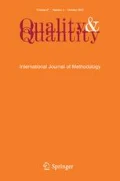Abstract
We are flooded with a wave of writings on causality in the social sciences during the last decades. The same holds for the relationship between quantitative and qualitative research in the social sciences. An enormous amount of texts appears on (causality in) qualitative research, mostly in a controversy with quantitative research. These writings induced us to develop the thesis of “unity in diversity”, i.e., that there is no difference “in principle” between causality in qualitative and quantitative research, because both are supported by what I will call an “experimental logic”. In developing this thesis a plea is being made for going back to the sources. A historical overview of theories of causality is presented, which develops into two prominent views: INUS-causation and causal realism. A historical framework is also outlined for the opposition between quantitative and qualitative research, in which French positivism and British empiricism are opposed to German neo-kantianism and neo-hegelianism. After having developed the thesis of “unity in diversity” for this historical framework, the same is being done for the recent literature: “mixed methods research”, the book DSI of KKV, the reactions of David Collier and “QCA” of Charles Ragin. At the end the question of small-n research and the case n = 1 is examined.
Similar content being viewed by others
References
Apostel L.: Matière et forme. Introduction à une épistémologie réaliste. Communication and Cognition, Gent (1974)
Aristotle: Metaphysica. Het Wereldvenster, Baarn (1977)
Bhaskar R.: A Realist Theory of Science. Harvester Wheatsheaf, New York (1978)
Bhaskar R.: The Possibility of Naturalism. A Philosophical Critique of the Contemporary Human Sciences. The Harvester Press, Brighton (1979)
Blalock H.M.: Causal Models in the Social Sciences. MacMillan, London (1971)
Braam G.P.A.: Invloed van bedrijven op de overheid, een empirische studie over de verdeling van maatschappelijke invloed. Boom, Meppel (1973)
Brady H.E., Collier D.: Rethinking Social Inquiry: Diverse Tools, Shared Standards. Rowman & Littlefield, Berkeley (2004)
Bunge M.: Causality. The Place of the Causal Principle in Modern Science. Harvard University Press, Cambridge (1959)
Cartwright N.: Nature’s Capacities and their Measurement. Oxford University Press, Oxford (1989)
Collier D., Mahoney J.: Insights and pitfalls: selection bias in qualitative research. World Polit. 49(1), 56–91 (1996)
Comte, A.: Cours de philosophie positive. Librairie Larousse, Paris (1830–1842)
Creswell J.W.: Research Design. Qualitative, Quantitative, and Mixed Methods Approaches. Sage, Thousand Oaks (2003)
Denzin N.K., Lincoln Y.S.: Handbook of Qualitative Research. Sage, Thousand Oaks (1994)
Deutsch M., Collins M.E.: Interracial Housing. University of Minnesota Press, Minneapolis (1951)
Eckstein H.: Case study and theory in political science. In: Greenstein, F.I., Polsby, N.W. (eds) Handbook of Political Science, Addison-Wesley, Reading, MA (1975)
Elster J.: Nuts and Bolts for the Social Sciences. Cambridge University Press, Cambridge (1989a)
Elster J.: The Cement of Society. A Study of Social Order. Cambridge University Press, Cambridge (1989b)
Glaser B.G., Strauss A.L.: De ontwikkeling van gefundeerde theorie (The Discovery of Grounded Theory). Samson, Alphen a/d Rijn (1976)
Goldthorpe J.H.: On Sociology. Narratives and the Integration of Research and Theory. Oxford University Press, Oxford (2000)
Harré R., Madden E.H.: Causal Powers. A Theory of Natural Necessity. Basil Blackwell, Oxford (1975)
Hempel C.G.: Aspects of Scientific Explanation and other Essays in the Philosophy of Science. Collier- MacMillan, London (1965)
Hume D.: A Treatise of Human Nature. Clarendon Press, Oxford (1739)
Hume, D.: Het menselijk inzicht (Enquiries Concerning Human Understanding), vert. J. Kuin. Boom, Meppel 1978 (1748)
Hume, D.: Philosophical Essays Concerning Human Understanding (1786) (London, A. Millar, 1748) revised edition (London, M. Cooper, 1751); republished as An Enquiry Concerning Human Understanding in Essays and Treatises on Several Subjects (London, A. Millar, Edinburgh, A. Kincaid & A. Donaldson, 1758); republished in 1786
Jöreskog, K.G.: A general method for estimating a linear structural equation system. In: Goldberger, A.S., Duncan, O.D. Structural Equation Models in the Social Sciences, pp. 85–112. Seminar Press, London (1973)
Kant I.: Kritik der reinen Vernunft. Felix Meiner, Hamburg (1781)
King G., Keohane R.O., Verba S.: Designing Social Inquiry. Scientific Inference in Qualitative Research. Princeton University Press, Princeton (1994)
Kuhn Th.: The Structure of Scientific Revolutions. University of Chicago Press, Chicago (1962)
Mackie J.: The Cement of the Universe. A Study of Causation. Oxford University Press, Oxford (1974)
Mill J.S.: A System of Logic, Ratiocinative and Inductive. Routledge & Kegan Paul, London (1872)
Popper K.: The Logic of Scientific Discovery. Hutchinson, London (1959)
Popper K.: Objective Knowledge. A Realist View of Logic, Physics and History. Clarendon Press, Oxford (1966)
Ragin C.C.: The Comparative Method. Moving Beyond Qualitative and Quantitative Strategies. University of California Press, Berkeley (1987)
Salmon W.C.: Scientific Explanation and the Causal Structure of the World. Princeton University Press, Princeton (1984)
Scriven M.: Explanation and prediction in evolutionary theory. Science 130, 477–482 (1959)
Suppes P.: A Probabilistic Theory of Causality. North Holland Publishing Company, Amsterdam (1970)
Tacq J.J.A: Causaliteit in Sociologisch Onderzoek. Een Beoordeling van Causale Analysetechnieken in het Licht van Wijsgerige Opvattingen over Causaliteit. Van Loghum Slaterus, Deventer (1984)
Tacq J.J.A.: Het methodologisch atelier. Adviezen en beschouwingen voor de sociale wetenschappen. Acco, Leuven (2001)
Tashakkori A., Teddlie C.: Handbook of Mixed Methods in Social & Behavioral Research. Sage, Thousand Oaks (2003)
Thomas, W.I., Znaniecki, F.: The Polish Peasant in Europe and America. Gorham Press, Boston (1918–1920)
van den Braembussche A.: Theorie van de maatschappijgeschiedenis. Ambo, Baarn (1985)
van Parijs Ph.: Théorie des catastrophes et materialisme historique. Revue française de sociologie 19, 195–220 (1978)
Wittgenstein, L.: Tractatus Logico-Philosophicus, edited by D.F Pears. Routledge, London (1981)
Wittgenstein, L.: Philosophical Investigations (tr. G.E.M. Anscombe). Prentice Hall, New York (1999)
Wright S.: The method of path coefficients. Ann. Math. Stat. 5, 161–215 (1934)
Znaniecki, F.: The Method of Sociology. Octagon, New York (1934), reprinted in 1962
Author information
Authors and Affiliations
Corresponding author
Rights and permissions
About this article
Cite this article
Tacq, J. Causality in qualitative and quantitative research. Qual Quant 45, 263–291 (2011). https://doi.org/10.1007/s11135-009-9293-0
Published:
Issue Date:
DOI: https://doi.org/10.1007/s11135-009-9293-0




